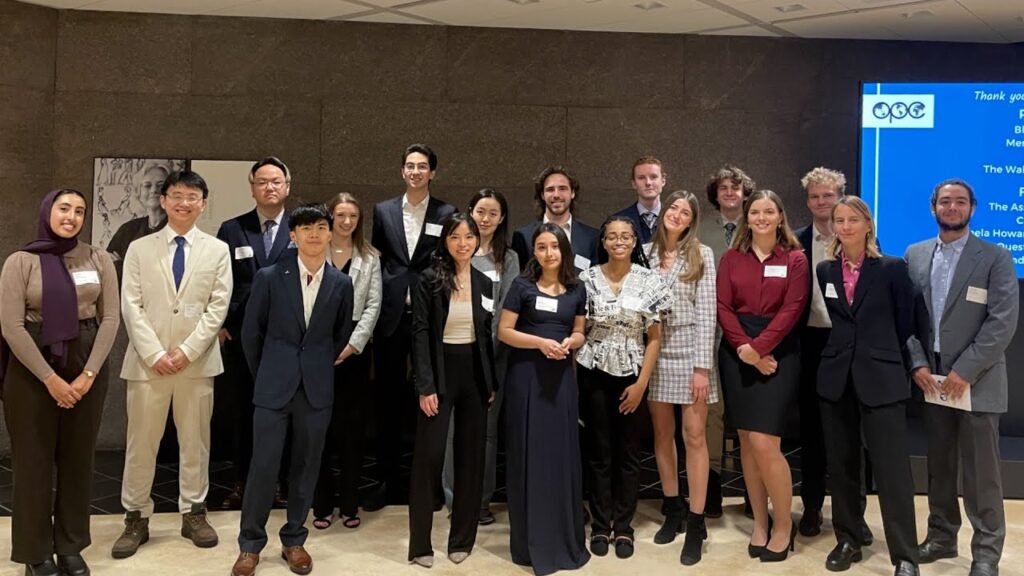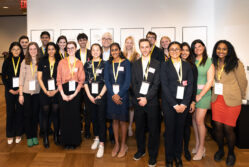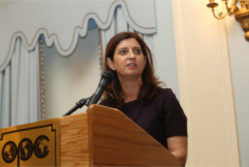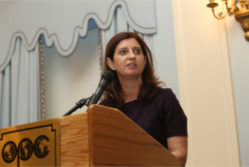Archive Event Highlight

OPC Foundation Honors 2023 Scholars at Evening Reception

Left to right: Sarah Raza, Yucheng Tang, Francis Tang, Chris Chang, Viola Flowers, Simon Levien, Kaela Malig, Rayna Song, Nuha Dolby, Zane Irvin, Kailyn Rhone, Devin Seán Martin, Madeleine Long, Andrew Califf, Rachel Nostrant, Daniel Shailer, Lucy Papachristou and Youcef Bounab
by Chad Bouchard
OPC Foundation President William J. Holstein opened this year’s scholarship awards celebration on May 1, the first to be held in person since February 2020, by commending the foundation’s continued support for aspiring international journalists through the challenges of the pandemic.
“Working together over the years, we have created entire generations of foreign correspondents all over the world,” he said.
To watch a full recording of the celebration, scroll to the bottom of this recap for an embedded video window, or click here.
At this year’s ceremony, family and friends gathered to honor 18 journalists chosen by judges to be among the best of their generation. Holstein said the foundation would send winners this year to Associated Press, Reuters and Wall Street Journal in Bangkok, Mexico City, London, one to either Paris or Dakar, and one to the Middle East.
The foundation’s listing of this year’s winners is here, and a PDF copy of the full program with details about each scholar can be found here.
The foundation announced this year’s launch of a new award in the name of Seymour and Audrey Topping.
“Top was and Audrey remains true heroes to me for their absolutely breakthrough reporting in China, where I also served, but also in the Soviet Union, Vietnam, and in many other places,” Holstein said. “They dedicated most of their lives to the sacred mission of being correspondents on the ground.”
The evening included a video chronicling the Toppings’ careers in photographs and news clippings that spanned decades. Each of this year’s scholars recorded a short video presentation that included video clips and images of their work.
The OPC Foundation expressed gratitude to its sponsors, the Patrons: Bloomberg, Mercedes-Benz, Reuters and The Wall Street Journal, and its Friends: The Associated Press, CBS News, the Pamela Howard Family Foundation, Quest Diagnostics and the Taipei Economic and Cultural Office in New York.
The first recipient of the Topping scholarship is Chris Chang, a student at the University of California Berkeley Graduate School of Journalism. In his video, Chang talked about his coverage of protests in Hong Kong, “watching the citizens calling out for their freedom while facing police brutality.”
Chang, who grew up in Taiwan, said his background gave him a “front-row seat” to witness how a nation and its people can survive between two superpowers.
“Now, I’m inspired to use my skills as a video journalist to tell the stories of those everyday people in a region who simply want a better and freer life,” he said.
Chang speaks English, Japanese and Mandarin and wants to focus his career on covering East Asia and relations between the U.S. and Japan.
The winner of the Roy Rowan Scholarship this year is Nuha Dolby, spoke about her family’s personal history that started in Bangladesh. She said her mother fled the genocide in Bangladesh in the early 1970s in hopes for a better life, while leaving behind the life she had built at home and her ambitions to become a journalist. Dolby said she has been able to achieve things her mother did not think possible as a woman at her age, including filing bylines with The Associated Press, Bloomberg, Politico, the Milwaukee Journal-Sentinel, and others.
“I was able to go to Dhaka, the capital, and speak to hospital workers and patients during the pandemic, and their gratitude showed me the power of being an American writer writing about somewhere else.” She said she looks forward to honoring her heritage by taking opportunities she received in America, “and engaging with where my family originally hails from in tandem.”
Dolby is fluent in Bangala and intends to return to cover the impact of climate change on Bangladeshis and their culture. She has an OPC Foundation fellowship with the Wall Street Journal in London, returning to the home country of her father, this June.
Zane Irvin, the Flora Lewis/Jacqueline Albert-Simon Scholarship winner, recounted a story about the time he “accidentally” interviewed a warlord in Cameroon. With funding from a Pulitzer Center grant, he traveled there in the summer of 2022 to report on the violent conflict between the government and militant groups in the western parts of the country.
Irvin said while he was reporting, he stumbled on a man who called himself a “social media warlord,” who used Facebook to impersonate a prominent separatist.
“After taking safety precautions, I wound up spending four hours in a bakery, of all places, interviewing a man who spreads disinformation, peddles propaganda, and orchestrates killings from his smartphone,” he said.
Irvin is currently a senior majoring in political science and French at Swarthmore College, and works on podcasts for War News Radio.
Lucy Papachristou, the winner of the Jerry Flint Award for International Business Reporting, talked about how she had worked in Bosnia with a global investigative news outlet and volunteered at a refugee center outside of Sarajevo. She returned years later to cover the refugee crisis at a remote village near the Croatian border.
“I learned that knowledge comes from time,” she said. “Moments when nothing is happening, the conversation falters, and you put your notebook aside. It comes from gathering firewood with your interview subjects so they can offer you tea. It comes from looking at photographs of people’s children whom they haven’t seen in years – patterns repeated over and over until their truth is etched into you.”
Papachristou currently covers technology as an intern with Bloomberg News. She graduated from Carleton College and is fluent in Russian. Papachristou hopes to return to the country of Georgia to complete a project about the influence of politics on the cryptocurrency industry.
This year’s winner of the Harper’s Magazine Scholarship in memory of I.F. Stone is Youcef Bounab, started his journalism career as a native Algerian working for national newspapers in Algiers. He moved to New York in 2018, but soon returned home again to cover protests and the ousting of President Abdelaziz Bouteflika. Amid a government crackdown on local journalists and activists, he wanted to report the news for foreign media.
“As I read other foreign coverage of the protests, I realized that while reporting internationally could shield you from censorship,” he said. “It presents you with a higher risk of misrepresenting your sources and perpetuating some of the harmful narratives and tropes about the places you cover.”
Bounab is a graduate of the University of Algiers who recently graduated from the Craig Newmark School of Journalism at City College of New York. He speaks English, French, Darija and Classical Arabic.
Kaela Malig, recipient of the Sally Jacobsen Fellowship, spoke about her experience growing up in the Philippines in a Filipino-Chinese household.
As a young adult, she volunteered at orphanages and shelters for sexually abused women. In Malig’s scholar application essay, she wrote about children orphaned by the Philippine drug war.
As she traveled around Asia, in countries such as Vietnam and Thailand, she said she “always felt the ghosts of my own home, be it in the form of poverty or exploitation, especially felt by women and children in the presence of another, just brought by a different set of systems in history.”
Malig has worked for Rappler, CNN and The Washington Post. She is a student at Columbia University’s Graduate School of Journalism and is a graduate of Ateneo de Manila University. She speaks Tagalog, Mandarin and Hokkien.
Click the window below to watch the whole awards program.



